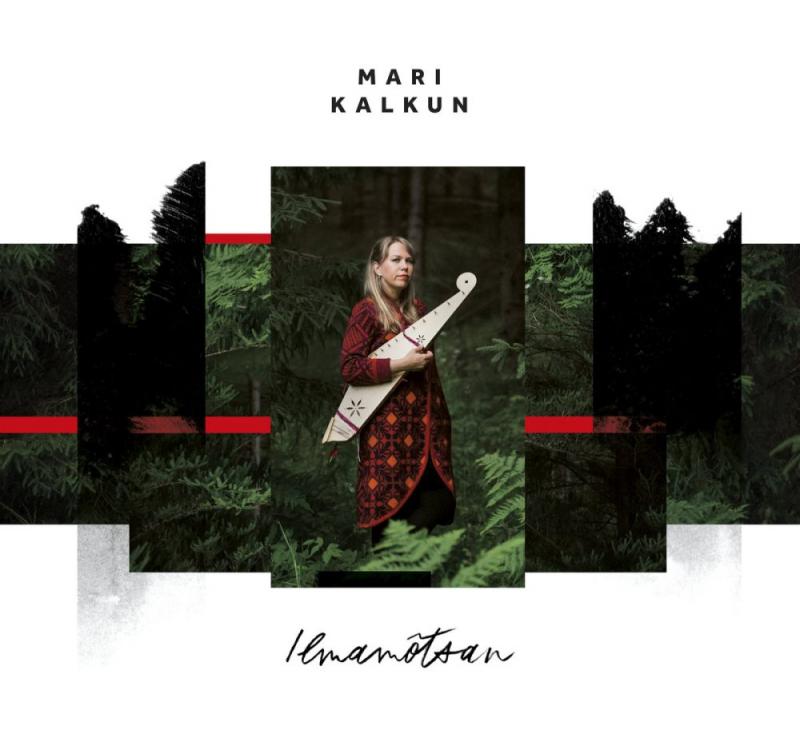CD: Mari Kalkun - Ilmamõtsan | reviews, news & interviews
CD: Mari Kalkun - Ilmamõtsan
CD: Mari Kalkun - Ilmamõtsan
Exquisite third album from the Estonian folk-based singer-songwriter

Ilmamõtsan’s centrepiece is “Linnaitk”, a disconcerting vocal-only composition playing distress-permeated chants off against a keening wordless melody line sounding as much an expression of grief as a call for support. The language is Estonian and “Linnaitk” translates as “City Lament”. It is written to capture the feelings of a mother whose daughter has left the village for the big city.
While not all of Ilmamõtsan is this overtly affecting, the album reflects an acute sense of context and place. “Ngadei!” sets to music a poem by the Siberian writer Yuri Vella (1948-2013) who worked to organise opposition to gas and oil companies destroying environments, killing reindeer and persecuting indigenous peoples. Ilmamõtsan – meaning “In the Wood of the World” – is political. It also beautiful, and features 12 songs with haunting, unforgettable melodies sung in a crystalline yet forceful voice.
Mari Kalkun is an Estonian folk-based singer-songwriter who reconfigures the traditional to fit a vision of music which reflects its milieu. She plays the accordion, harmonium, kannel (the Estonian zither), chimes, bells and the luuvuur – the bone spinner. Her third solo album, Ilmamõtsan follows 2015’s Tii Ilo, recorded with her band Runorun. Despite the lack of an ensemble, cohesion and warmth bring the feel of a collaborative recording. There is also a meditative, practically psychedelic, mood induced by the drone of open strings and the local penchant for repetition.
An inherent tenderness is most apparent with the final track “Linda, Linda! Fly, Linda”, which is dedicated to her own daughter. With the accompaniment of a local brass band, the song expresses the hope that her life will be supported by strong wings. Ilmamõtsan is an exquisite, heartfelt album. Language is no barrier to being won over by its particular magic.
rating
Explore topics
Share this article
The future of Arts Journalism
You can stop theartsdesk.com closing!
We urgently need financing to survive. Our fundraising drive has thus far raised £49,000 but we need to reach £100,000 or we will be forced to close. Please contribute here: https://gofund.me/c3f6033d
And if you can forward this information to anyone who might assist, we’d be grateful.

Subscribe to theartsdesk.com
Thank you for continuing to read our work on theartsdesk.com. For unlimited access to every article in its entirety, including our archive of more than 15,000 pieces, we're asking for £5 per month or £40 per year. We feel it's a very good deal, and hope you do too.
To take a subscription now simply click here.
And if you're looking for that extra gift for a friend or family member, why not treat them to a theartsdesk.com gift subscription?
more New music
 Album: Blood Orange - Essex Honey
A triumph of the artist who doesn't clamour for attention but just keeps growing
Album: Blood Orange - Essex Honey
A triumph of the artist who doesn't clamour for attention but just keeps growing
 Houghton / We Out Here festivals review - an ultra-marathon of community vibes
Two different but overlapping flavours of subculture full of vigour
Houghton / We Out Here festivals review - an ultra-marathon of community vibes
Two different but overlapping flavours of subculture full of vigour
 Album: Wolf Alice - Clearing
Ten years from their debut, Wolf Alice once again make magic from the familiar
Album: Wolf Alice - Clearing
Ten years from their debut, Wolf Alice once again make magic from the familiar
 Album: Deftones - Private Music
Deftones give us a glimmer of hope, but that's all...
Album: Deftones - Private Music
Deftones give us a glimmer of hope, but that's all...
 Album: Eve Adams - American Dust
Taking inspiration from the Californian desert
Album: Eve Adams - American Dust
Taking inspiration from the Californian desert
 Gibby Haynes, O2 Academy 2, Birmingham review - ex-Butthole Surfer goes School of Rock
Butthole Surfers’ frontman is still flying his freak flag but in a slightly more restrained manner
Gibby Haynes, O2 Academy 2, Birmingham review - ex-Butthole Surfer goes School of Rock
Butthole Surfers’ frontman is still flying his freak flag but in a slightly more restrained manner
 Album: Adrian Sherwood - The Collapse of Everything
The dub maestro stretches out and chills
Album: Adrian Sherwood - The Collapse of Everything
The dub maestro stretches out and chills
 Music Reissues Weekly: The Residents - American Composer's Series
James Brown, George Gershwin, John Philip Sousa and Hank Williams as seen through an eyeball-headed lens
Music Reissues Weekly: The Residents - American Composer's Series
James Brown, George Gershwin, John Philip Sousa and Hank Williams as seen through an eyeball-headed lens
 Album: Dinosaur Pile-Up - I've Felt Better
Heavy rock power pop trio return after an unwanted lengthy break
Album: Dinosaur Pile-Up - I've Felt Better
Heavy rock power pop trio return after an unwanted lengthy break
 Album: Tom Grennan - Everywhere I Went Led Me To Where I Didn't Want To Be
British pop star's fourth exhibits ultra-pop oomph with mixed results
Album: Tom Grennan - Everywhere I Went Led Me To Where I Didn't Want To Be
British pop star's fourth exhibits ultra-pop oomph with mixed results
 Album: Emma Smith - Bitter Orange
The award-winning jazz singer brings new life to some classic standards
Album: Emma Smith - Bitter Orange
The award-winning jazz singer brings new life to some classic standards
 BBC Proms: Anoushka Shankar 'Chapters' review - somehow, it worked
Shankar's starry presence brings focus to this orchestral version
BBC Proms: Anoushka Shankar 'Chapters' review - somehow, it worked
Shankar's starry presence brings focus to this orchestral version

Add comment